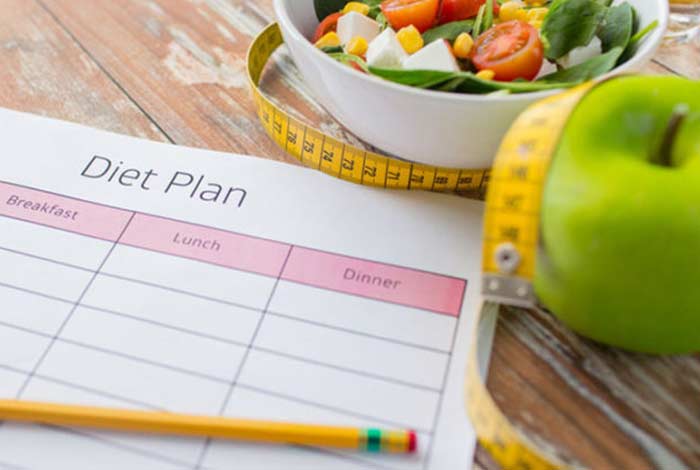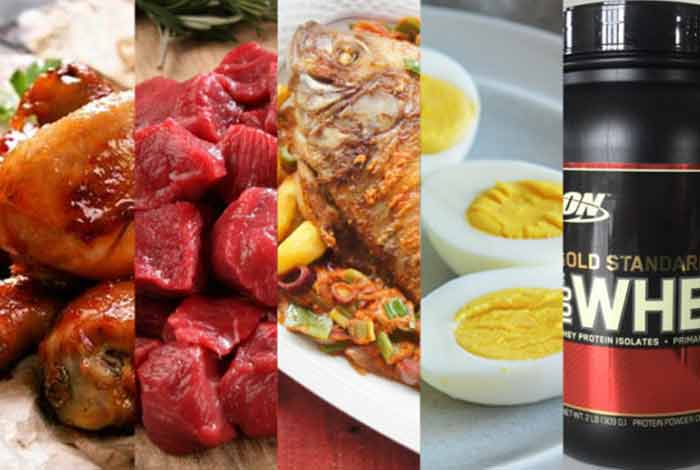
Muscle Building Diet Plan for Beginners

The first thing to consider before stepping into your muscle training program is your diet. This entails cleaning up your body and having a track of what goes inside it. A perfect diet is as important as the weights you will be training with. You need to review your daily nutritional intake to support your new, more active lifestyle. Different people need different diets and their nutritional requirement are also different. But, there are some basic guidelines that follow the one-shoe-fit-all approach.
As a very first step, you would require to cut the junk out of your life; all the things that you love, fast foods, sugary sodas, cheesy burgers and so on. They only fill you up with empty calories and fats, with no nutritional value.
Proteins are known as building blocks of muscles. The second most important thing you will be doing is increasing your protein intake by having protein-rich food like chicken, tuna, beef, tofu, etc.
Now, with your increased and improved food intake, you will need a better digestive system to get optimum results. Fibers are of great help in improving the functioning of digestive system. Include sources of fibers like psyllium, fruits, green vegetables in your diet.
You may have a perfect diet and perfect digestive system, but this might not be enough until you have proper amount of water intake throughout the day. Lack of water may lead to sluggishness, headache and mental breakdown. Getting dehydrated is one of the worst things that can hinder your muscle building training. It is a good idea to have around a gallon of water a day.
But, here is a word of caution! You may want to be as strong as “American muscle,” but mind it, you are not a machine! Hence, filling up your fuel tank at once is not a good idea. In fact, “four to six meals a day” plan is what has been recommended by most of the muscle building trainers.
So, your first task in this regard is to calculate the nutritional needs of your body.
Calculating Your Calorie Needs
To calculate your calorie need, the first thing you would require to do is to calculate your basal metabolic rate (BMR) – the amount of calorie your body needs to perform basic functions to keep you alive, i.e., if you spend a day without doing anything. Once you know your BMR, the next thing you would need is to calculate your total daily energy expenditure (TDEE). This is the sum of your BMR and your daily activities.
Now, depending on your body type, you can build lean, bulk or aggressive bulk.
- Lean Bulk: This is recommended to a healthy person.
Total calorie intake = TDEE + 250 calories
- Aggressive Bulk: If you are underweight and want to gain mass, then aggressive bulk is what you need.
Total calorie intake = TDEE + 500 calories
Note: The above calculations are suited to most of the people. However, individual variables like hormones, genotypes and nervous system dominance can make a significant difference.

Planning the Diet
After calculating your calorie intake, the next step is to plan your daily diet accordingly. To better understand the art of planning a diet, let’s consider example discussed below:
Consider a pseudo person with the following specifications:
- Age: 20 years
- Weight: 150 pounds
- Height: 6 feet
- Body type: Skinny
- Frequency of training: 4 days per week
- TDEE – 2750 calories
Calorie target for aggressive bulk – 2750+500 = 3250 calories
| Meal 1 | |
| Ingredients | Servings |
| Oatmeal | 1.5 cups |
| Whole Eggs | 3 Large |
| Banana | 1 Large |
| Assorted Veggies | 1 cup |
| Calorie/carbs/ Fats/ Protein – 865/125 grams /25 grams /35 grams | |
| Meal 2 | |
| Ingredients | Servings |
| Chicken | 4 ounces |
| White Rice | 2 cups |
| Broccoli | 1 cup |
| Olive oil | 1 table spoon |
| Calorie/Carbs/Fats/Proteins – 820/120 grams/20 grams/40 grams | |
| Meal 3 | |
| Ingredients | Servings |
| Ground Sirloin | 6 Ounces |
| Sweet Potatoes | 2 Large |
| Green Beans | 2 Cups |
| Diced Mango | 1 Cup |
| Calories/ Carbs/ Fats/ Protein – 855/90 grams/15 grams/40 grams | |
| Meal 4 | |
| Ingredients | Servings |
| 93/7 Ground Turkey | 4 Ounces |
| Whole-Wheat Spaghetti | 6 ounces |
| Tomato Sauce | ½ Cup |
| Apple | 1 |
| Calories/Carbs/Fats/Protein – 870/155 grams/10 grams/45 grams | |
Note:
- The above diet plan is just an example, and you do not have to follow it exactly.
- This is just for your better understanding on how to prepare one for your own.

Things You Can Include in Your Diet
Proteins:
- Chicken
- Lean Beef
- Fish
- Eggs
- Whey protein

Carbohydrates:
- Rice
- Oats
- Quinoa
- Fruits
- Vegetables
- Potatoes

Fats:
- Olive Oil
- Coconut Oil
- Cheese
- Mixed nuts
- Avocados

As your training session will progress, you will find it increasingly difficult to cope up with your calorie requirement and possibly, you will then need to add supplements to your diet.
Foundational Supplements
A supplement should always complement your diet rather than replacing it. If your supplements are costing you more than the groceries, it is a sign that you are on the wrong track.
Types of supplements you can incorporate in your diet:
- Creatine
- Fish oil
- Vitamin D
- Whey protein
Other supplements that you may include:
- Probiotics
- Branch chained amino acids (BCAAs)
- Zinc monomethionine aspartate (ZMA)

Some Nutritional Tips
Now, when you are in a state to prepare your own diet plan, here are a few nutritional tips you should follow before you get going:
Protein:
- Pack your workout with both pre- and post-protein drinks
- Have abundant of protein, divided equally among all the meals of the day
- Allow a gap of 3-4 hours between two meals
Carbohydrates:
- Should be taken about 30 minutes before and after the workout
- Take according to personal preferences
- Have fruits, vegetables, rice, potatoes and so on
- Do not avoid carbohydrates, they are important
Fats:
- Avoid fat intake around the workout hours
- Polyunsaturated, saturated and mono-saturated sources should be in equal proportions in your diet
- Have optimum amount of Omega-3 fatty acids











